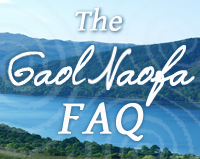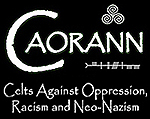La Fhèill Brìghde sona dhuibh!
Gaol Naofa is proud to present our latest article for the website, this time focusing on Children and Family in Gaelic Polytheism.
Although the main purpose of the article is to give parents ideas on how to include children in a family-based Gaelic Polytheist practice, we hope it will also prove useful for individuals – whether youth or adults – who are new to GP, as well as to other sorts of multigenerational spiritual communities.
The basics of belief and practice are broken down into their various elements, and practical ideas and examples of simple prayers are given that a child or beginner should be able to get to grips with easily enough.
Website readers may notice that the pdf files of most of our articles are now embedded in the site, as well as available on Scribd. Please let us know if you come across any broken links or dropped content that may have happened during these formatting changes.
We have also made some slight changes in organisational structure, with Annie Loughlin now serving as Uachtarán (President), organising and running Gaol Naofa from Scotland. After five years at the helm, Treasa Ní Chonchobhair is now filling the position of Leas-Uachtarán (Vice President). We would like to extend our deep gratitude to Treasa for her years of service and continued commitment to Gaol Naofa, as well as to Annie for taking her turn at the helm. For more details please refer to our page on Council and Structure.
February 1, 2014
Gaol Naofa is proud to present our latest article which discusses our stance on the practice of flametending and Brigid’s threefold-flame. It’s been a bit of a challenge to write about this, as some of our reasons for our traditions are more private and not something we want to post on the Internet. However, as there are many people out there arguing against tradition, and we heard they were going to be publishing, we made the choice to discuss this. We have only used liturgy that is in the public domain, not the private or women-only liturgy we use.
In our FAQ we mention the struggle around whether to participate in a project with questionable material, and whether it’s worth it to be in that company to provide an alternative voice. We had to face that issue with this piece. We wrote it in summer 2012 for an anthology, and the editors accepted it for publication and sent us the contracts.
Then we did some research into the backgrounds of one of the editors… and found she was involved in some pretty offensive cultural appropriation, namely, stealing songs and stories from Native Americans and misrepresenting them; some pretty serious misappropriation has been going on due to her writings. So we realised we could not be associated with that, and elected to publish one version on our website, with a more thoroughly footnoted and expanded version to come later.
One of the reasons there aren’t as many footnotes in this piece is that the editors of the anthology didn’t want footnotes. We will fix that in the future. Though we are kind of dreading what will appear in a book edited by appropriators and exploiters, we are grateful that the project inspired us to write this piece. So, silver lining and all :)
To read the essay, please visit here.
January 18, 2013
Fáilte!
While it may seem we’ve been quiet for a while, much has been happening behind the scenes as we’ve celebrated five years as an organisation. Our council has been very busy, creating new content for this site, as well as for private use by the members of Gaol Naofa. All of the site documents have been updated and restructured. While much of this site will still be familiar to our long-term readers, there is a lot of new material here.
Notably, we have substantially revised and expanded The Gaol Naofa FAQ into an 89 page pdf document that addresses many of the common questions about Gaelic Polytheism and, specifically, our Gaelic Polytheist Lifeway (Ár nDóigh Bheatha Ildiach is Gaelach / Ar Dòigh-Beatha Ioma-Dhiadhach Ghàidhealach) as practiced by the core members of Gaol Naofa.
New articles include “Rowan and Red Thread: Magic and Witchcraft in Gaelic Cultures” (pdf) — an in-depth look at practices and terminology in both historical and contemporary Gaelic cultures, as well as an upcoming piece on the Triple Flame of Brigid.
Adding to our series of practical, how-to articles, we have slightly revised the Offerings article, and written a companion piece on Prayer (pdf). The prayer article includes some new translations of liturgy, as well as practical instructions on building a Gaelic Polytheist practice.
Members will note that there is a new, members-only, Gealach Ur Rite, which has been completely rewritten to include traditional liturgy, ritual, and an accompanying article on the moon in Gaelic cultures. This will be available to renewing members in the new year.
We plan on opening up our membership process for new members after the activity of the Winter Holidays subsides a bit. In the meantime, you can get to know members of our community on our public Facebook group, where all who are interested in Gaelic Polytheism are welcome to come and chat with us, whether or not they are members of Gaol Naofa.
More coming soon!
December 11, 2012
Next page
Previous page
Bennacht nime, nél-bennacht,
Bennacht tíre, torad-bennacht,
Bennacht mara, íasc-bennacht
Gaelic Polytheism
On Social Media
Gaol Naofa Supports
2017 Calendar
25 January — Burns Night
31 January — Gealach Ùr
1 February — Lá Fhéile Bríde
1 March — Gealach Ùr
17 March — Lá Fhéile Pádraig
18 March — Sheelah's Day
25 March — Là na Caillich
29 April — Gealach Ùr
1 May — Lá Bealtaine
28 May — Gealach Ùr
21 June — Grianstad an tSamhraidh
27 June — Gealach Ùr
5 July — Laa Tinvaal
26 July — Gealach Ùr
1 August — Lá Lúnasa
24 August — Gealach Ùr
23 September — Gealach Ùr
29 September — Là Fhèill Mìcheil
22 October — Gealach Ùr
31 October — Oíche Shamhna
21 November — Gealach Ùr
30 November — Latha Naomh Anndra
21 December — Gealach Ùr
21 December — Grianstad an Gheimhridh
26 December — Lá an Dreoilín
31 December — Hogmanay







